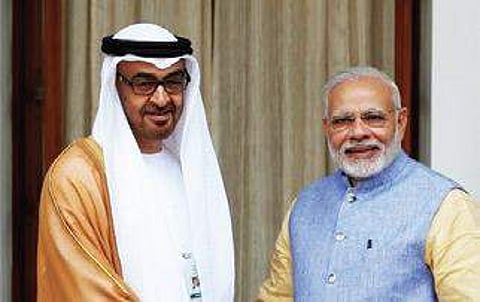

India has done well in its quest for better relations with all major powers in its western neighbourhood—from Israel and Egypt to Saudi Arabia and Iran. This has been no easy achievement, as virtually the entire Islamic world to our west is engulfed in deep rivalries. Apart from the traditional rift between Iran and Saudi Arabia, there are now even serious differences between Sunni Arab monarchies such as gas-rich Qatar on the one hand, and oil-rich Saudi Arabia and the UAE on the other.
Saudi Arabia is planning to build a 60km maritime channel along its border, to cut off Qatar from the mainland, causing huge shipping problems for its smaller neighbour. Even mediation by President Trump has failed to resolve these differences. The Americans have huge economic and strategic interests in Saudi Arabia and a military base in Qatar.
Even as this was happening, the relentless Saudi bombing of Yemen, in which the ‘President’ of the rebel Iranian-backed Shia-dominated Houthi Government was killed last month, has only intensified attacks on Saudi Arabia by Yemeni factions, using Iranian-supplied missiles. The Iranians, in turn, believe that Saudi Arabia is using Pakistani soil in Balochistan, to stir up unrest in its neighbouring Sunni majority Sistan-Baluchistan Province. A large contingent of Pakistani soldiers recently joined multilateral military exercises in Saudi Arabia, where tens of thousands of soldiers and several warships, including from the US, participated.
Given Trump’s decision to revoke the nuclear deal and re-impose sanctions on Iran, tensions in the region will inevitably escalate. Iran has not been a particularly reliable economic partner of India. It is prone to unilaterally revoking agreements on energy and other issues. Iran is, however, a crucial partner in facilitating economic and strategic access for India to Afghanistan and Central Asia, in the face of a land blockade by Pakistan, of Indian exports to Iran and Central Asia. Iraq has, meanwhile, emerged as the largest source of oil supplies to India. The Shia majority country, scheduled to have Parliamentary elections later this year, has to play a delicate balance between Iran, which wields huge influence within Iraq itself, and its neighbouring oil-rich Arab monarchies. Iraq has, however, been consistently friendly to India.
New Delhi has a crucial interest in these developments in its western neighbourhood, as India is developing a vibrant petrochemical industry. Exports of finished petrochemical products, which reached an estimated $35.9 billion last year, play a crucial role in boosting our foreign exchange earnings. The personal contacts that Prime Minister Modi has developed with the rulers of Gulf Arab states such as Saudi Arabia, the UAE and Oman are paying rich economic dividends. Moreover, the world’s largest oil producer, Saudi Arabia’s ARAMCO, is set to acquire a 50 percent stake in a massive $44 billion oil refinery in Maharashtra. ARAMCO is the single largest supplier of oil to India, around 40 million tonnes of crude oil annually. The proposed refinery will significantly increase India’s exports of refined petroleum products in coming years.
Even as Saudi Arabia is planning to cut its foreign workforce, India can dexterously increase its presence in the kingdom as it proceeds with diversifying its economy. Remittances from our workers in the Gulf also play a crucial role in our balance of payments. With oil production set to increase in the US, Canada and Venezuela and prospects for increased oil and gas production in Australia and elsewhere, India should adopt marketing strategies jointly with major buyers like China and Japan, to ensure that the OPEC cartel does not raise oil prices excessively, like what happened in the past year.
dadpartha@gmail.com